7. Baseball and neighbors and Cubs, oh my!
Brian R. Wright
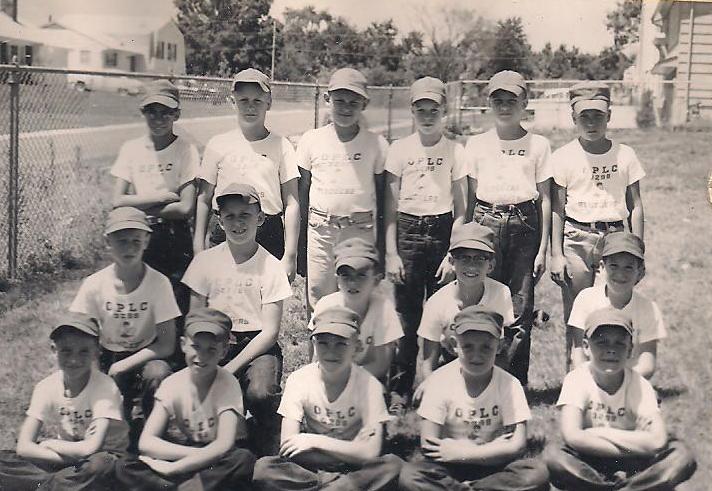 Note: These columns are a series, I will make into a volume of my memoirs. You may follow the links at top and bottom of page to go to preceding or succeeding episodes. The series starts here. {If the [Link to Episode <next>] at the bottom of the column does not show an active hyperlink, then the <next> column has yet to be written.}
Note: These columns are a series, I will make into a volume of my memoirs. You may follow the links at top and bottom of page to go to preceding or succeeding episodes. The series starts here. {If the [Link to Episode <next>] at the bottom of the column does not show an active hyperlink, then the <next> column has yet to be written.}
No doubt subconsciously I viewed my entry into the forced socialization program of government schooling as an anomaly, something im- posed on me by higher authority that down deep I resented and never treated seriously. In a word, unreal. [Keep in mind that in the 1950s, the states still held ultimate authority over our culture’s compulsory children’s (prison) schools; the federal Mob didn’t really didn’t start stirring the forced-schooling cauldron—mainly on policy and funding—until the 1960s, with LBJ’s Great Society great overreach.][1]
The above-right photo shows my first- or second-grade era baseball team, managed by my dad and sponsored by the Overland Park Lutheran Church (OPLC). I’m in the back row on the far right. I became hooked on baseball from the glowing first day Dad took us to Kansas City Municipal Stadium to watch the perennially cellar-dwelling Kansas City Athletics of the American League. [The A’s would alternate with the Washington Senators 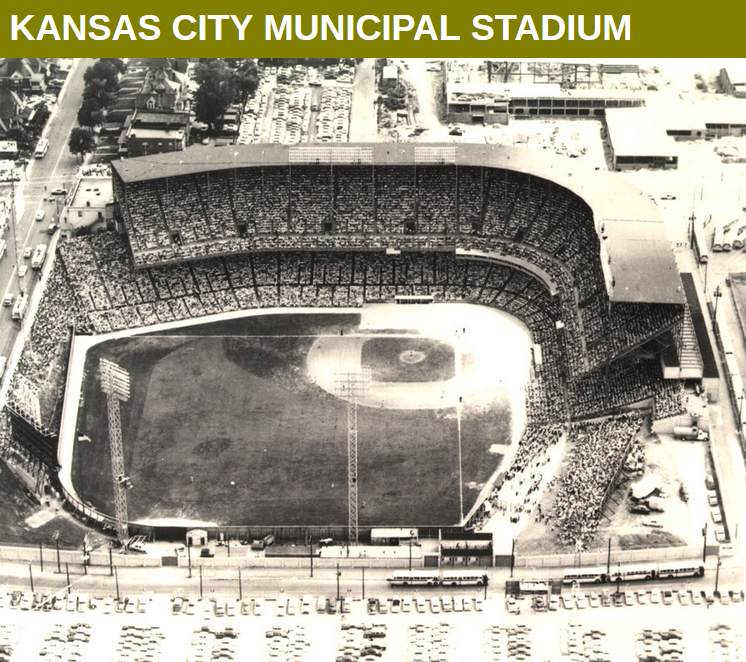 between eighth place and seventh place. But it was still the ‘Show,’ the major leagues of baseball.] The sights, sounds, smells, tastes… watching these giants throw the ball so fast around the horn, hit it so hard. More like gods than men—at play on hallowed ground. Going to the ball park was my first spiritual experience, a church far more moving/reverential than the one in town that my parents had signed us up for. From the age of 5 to 15 I knew what I was going to be when I grew up: a ballplayer.
between eighth place and seventh place. But it was still the ‘Show,’ the major leagues of baseball.] The sights, sounds, smells, tastes… watching these giants throw the ball so fast around the horn, hit it so hard. More like gods than men—at play on hallowed ground. Going to the ball park was my first spiritual experience, a church far more moving/reverential than the one in town that my parents had signed us up for. From the age of 5 to 15 I knew what I was going to be when I grew up: a ballplayer.
Living in the Neighborhood
Narrowing down the geography, again, and this current Google map of my old street shows pretty much what I regarded as my known universe until junior high school. More important, let me talk about the ones I got to know and played with—often in our back yard with Mom’s high-level supervision (she’d be washing dishes and doing all that housewife stuff, then occasionally look out the kitchen window).
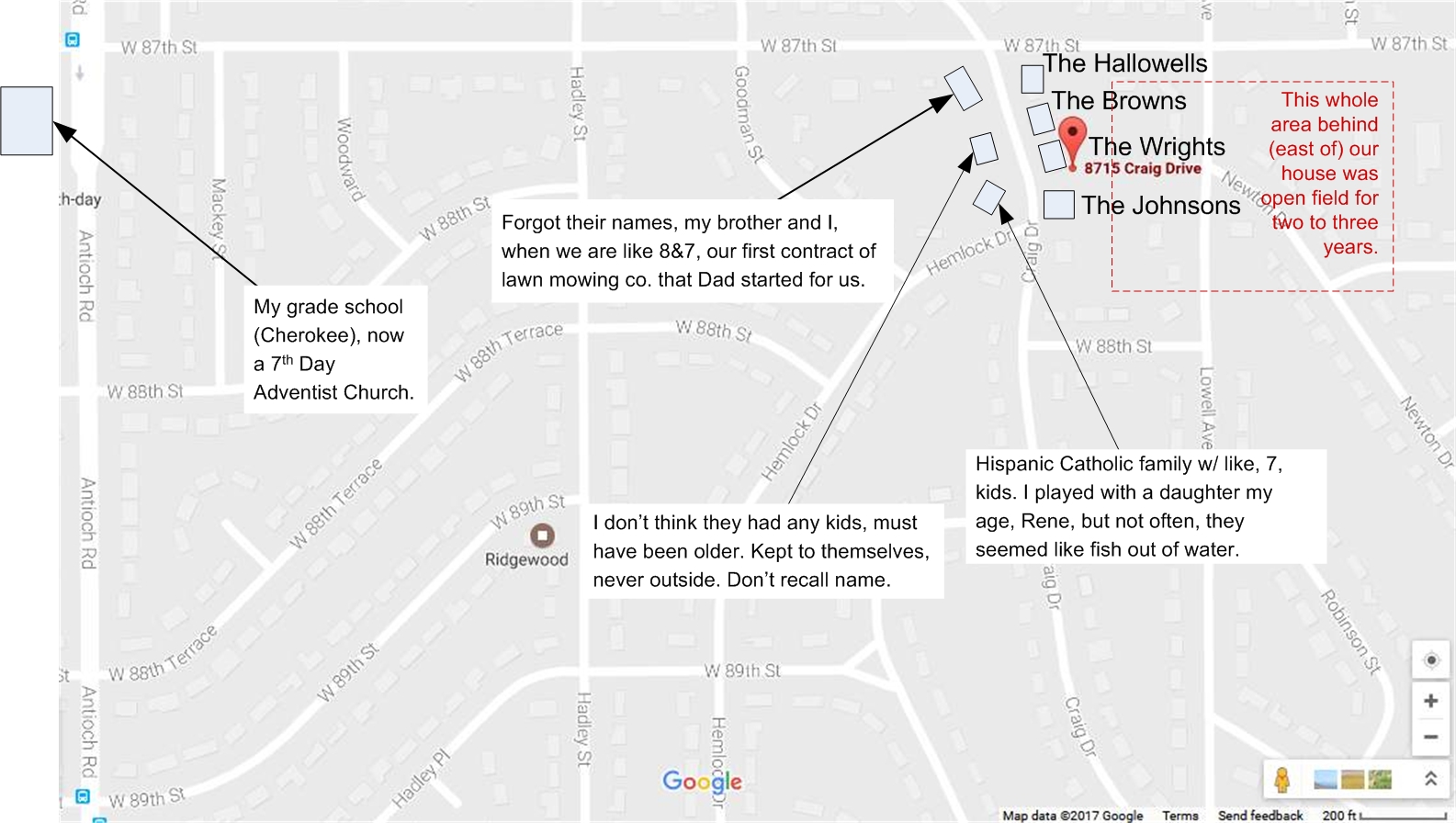
 Larry Johnson (left, on playground in front of Cherokee Grade School) was a year older than I was, and lived next door. I remember his mom being sweet to us kids… and pretty; Mr. Johnson worked for the post office. They didn’t have a clothes drier, maybe by choice, so she would hang her clothes out on a clothesline to air dry. Larry’s older brother, Richard, was two grades above me, bookish and serious. In Richard’s grade was a budding juvenile delinquent named Gary Capon, whose parents didn’t exercise the kind of care and attention that my folks or the Johnsons did. I remember once seeing Gary and some other bullying kid giving Richard a hard time as Richard was coming down the hill from school, knocking his books down and/or his musical instrument, to the point of Richard crying in frustration.
Larry Johnson (left, on playground in front of Cherokee Grade School) was a year older than I was, and lived next door. I remember his mom being sweet to us kids… and pretty; Mr. Johnson worked for the post office. They didn’t have a clothes drier, maybe by choice, so she would hang her clothes out on a clothesline to air dry. Larry’s older brother, Richard, was two grades above me, bookish and serious. In Richard’s grade was a budding juvenile delinquent named Gary Capon, whose parents didn’t exercise the kind of care and attention that my folks or the Johnsons did. I remember once seeing Gary and some other bullying kid giving Richard a hard time as Richard was coming down the hill from school, knocking his books down and/or his musical instrument, to the point of Richard crying in frustration.
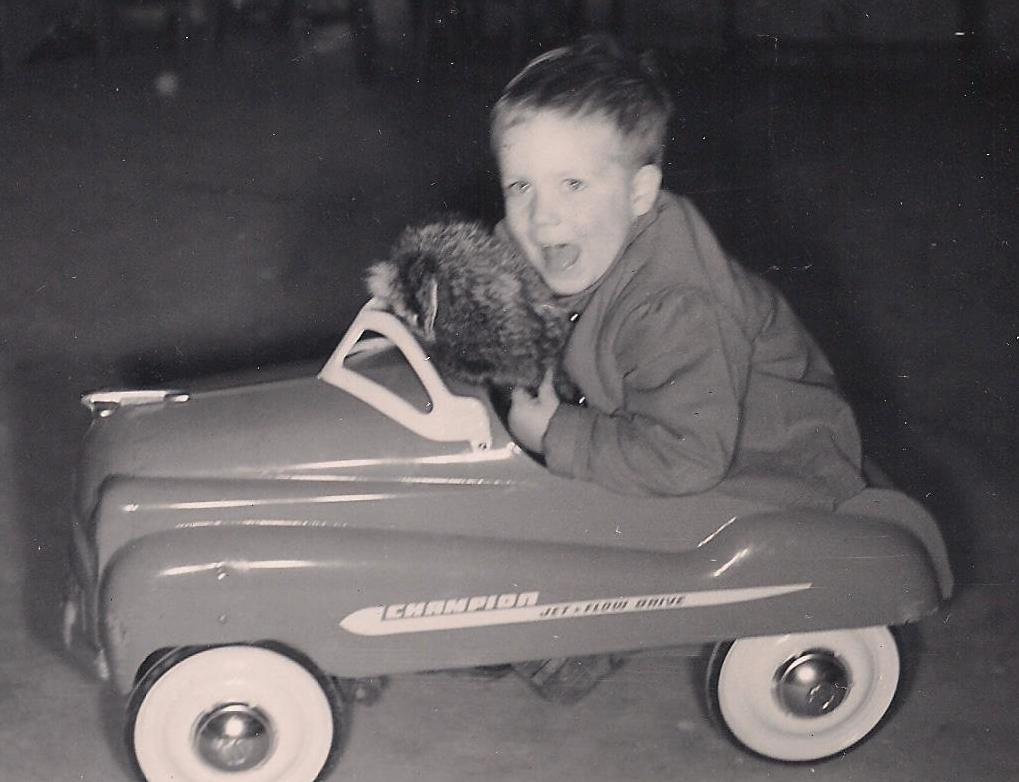 You can see from the above pic with Larry Johnson that by first grade I had graduated from tricycles and pretend racers to bicycles [image on left shows me with Davy Crockett-style coonskin cap in tow and ‘racer’ down in the basement following Christmas cornucopia… and judging from my expression, shortly before driving this new toy down the basement stairs (ref. Episode 2).] Learning to ride a bike took considerable desire on my part; with Dad’s help and encouragement I managed in about two weeks of trials ‘n’ spills. A bicycle was a HUGE boon to kid mobility, and gave us access essentially to anything within a couple of miles, such as downtown Overland Park, beyond which traffic got too heavy.
You can see from the above pic with Larry Johnson that by first grade I had graduated from tricycles and pretend racers to bicycles [image on left shows me with Davy Crockett-style coonskin cap in tow and ‘racer’ down in the basement following Christmas cornucopia… and judging from my expression, shortly before driving this new toy down the basement stairs (ref. Episode 2).] Learning to ride a bike took considerable desire on my part; with Dad’s help and encouragement I managed in about two weeks of trials ‘n’ spills. A bicycle was a HUGE boon to kid mobility, and gave us access essentially to anything within a couple of miles, such as downtown Overland Park, beyond which traffic got too heavy.
Note: General OP environs were a definite ‘5’ on individualist social-economist Catherine Austin Fitts so-called Popsicle Index. The Popsicle Index is a scale of 1 to 5 that indicates how confident a parent is that their five-year-old kid can walk (or bike) unattended to a store within a few-block radius and buy a Popsicle with no fear of being harmed.
Arranging to play outside of school was a high art. You could make contact in the classroom, if you were the same age, or at recess, then figure out how to hook up with that kid outside of school. Mom and Dad did not limit our access to the phone, an ancient rotary-dial model on what we called an exchange—before area codes. Our exchange was Niagara and I can still remember the number Niagara (NI) 2-6289. In return for phone access, we had to learn proper etiquette. When receiving a call, it was, “Hello, this is the Wright residence, Brian speaking.” No problem.
Transportation and communications both: the sky’s the limit!
The Cub Scout experience
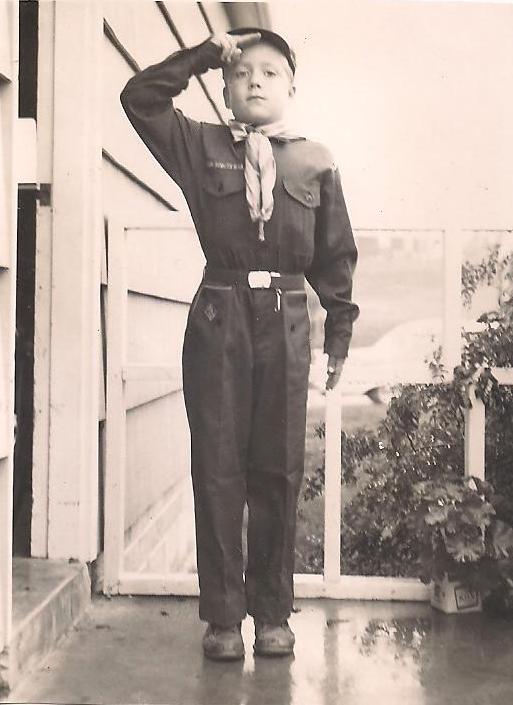 If you go into the history books and look up the Boy Scouts, you’ll see that the institution certainly has ulterior aims, folding into national, and, more recently global, collectivism. [Yes, there were the Girl Scouts, too, and Brownies… but in the big picture I can’t help see scouting’s application for girls as a mere afterthought by the controlling elites. The underlying structure of the ‘Western Cabal’ is patriarchal, after all—men are just more susceptible to and skilled at the application of big power.]
If you go into the history books and look up the Boy Scouts, you’ll see that the institution certainly has ulterior aims, folding into national, and, more recently global, collectivism. [Yes, there were the Girl Scouts, too, and Brownies… but in the big picture I can’t help see scouting’s application for girls as a mere afterthought by the controlling elites. The underlying structure of the ‘Western Cabal’ is patriarchal, after all—men are just more susceptible to and skilled at the application of big power.]
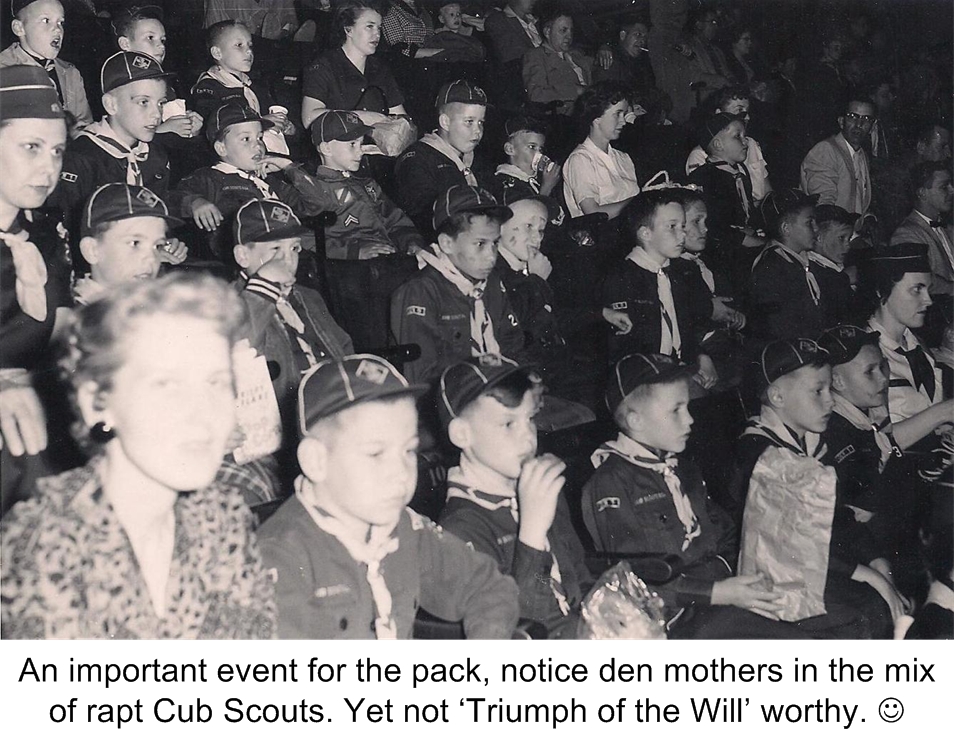 But I must say, at the time, I enjoyed scouting. Overall, it was a good thing. And frankly in my ideal world, something very much like it seems in order. We do have to pull together occasionally and, aside from that, scouting enables you to learn a wide variety of skills, including those essential to survival in Nature… where cooperation in a common goal is of paramount importance.
But I must say, at the time, I enjoyed scouting. Overall, it was a good thing. And frankly in my ideal world, something very much like it seems in order. We do have to pull together occasionally and, aside from that, scouting enables you to learn a wide variety of skills, including those essential to survival in Nature… where cooperation in a common goal is of paramount importance.
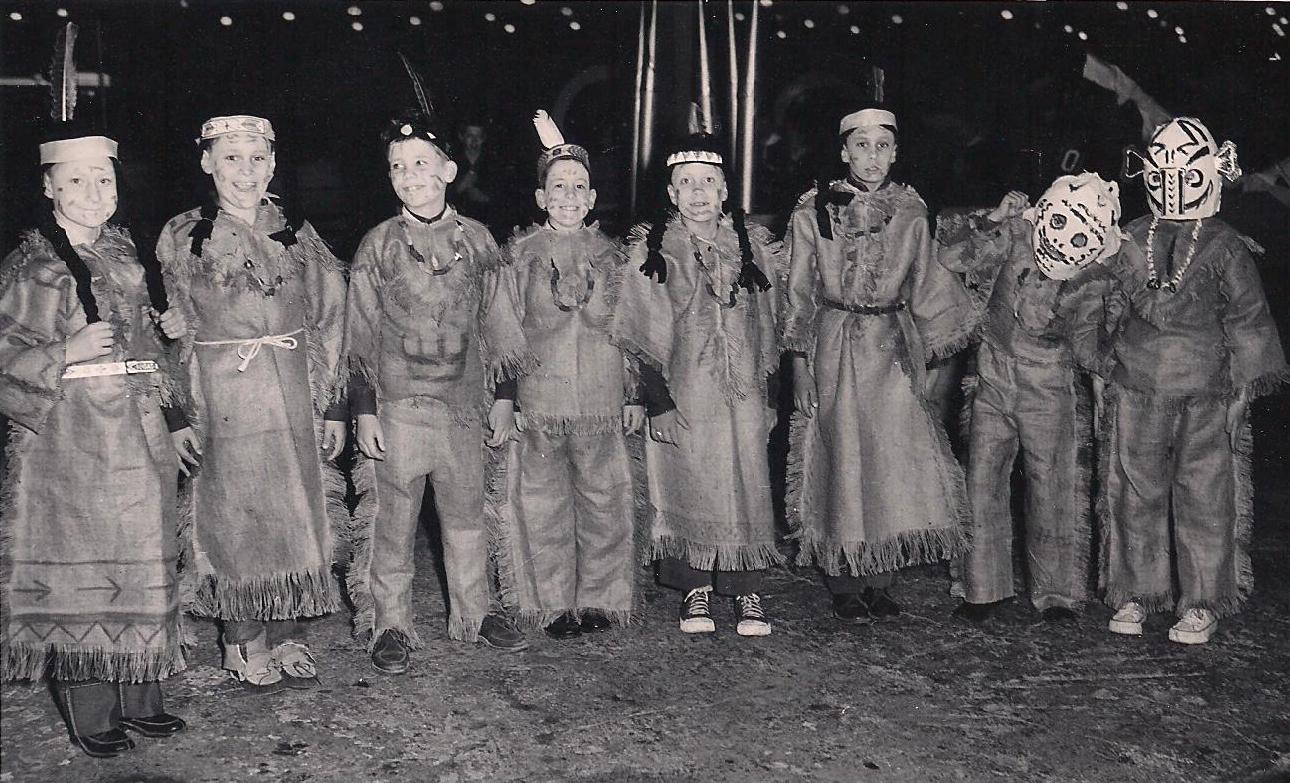 Also, to be fair, the Scouts, at least in those days, instilled some bona fide appreciation of America’s First Principles, and the Constitution as a protector of natural individual rights… not blind ‘My-Country-Right-or-Wrong’ submission to central state power. Despite the military-prep orientation of the organization, which complemented the church and state brain molding I disdained, I never felt scouting was UNreal like those institutions. It had honest value, even when it inexpertly tried to give indigenous Americans their due. From the photo above, I have absolutely no idea what cross dressing in a gunny sack, makeup, and wigs has to do with understanding Indian culture. [I’m the fourth maiden in from the right.] 🙂 Then again, this was the middle of the 1950s, Ike was President, and few were inclined to ask obvious questions.
Also, to be fair, the Scouts, at least in those days, instilled some bona fide appreciation of America’s First Principles, and the Constitution as a protector of natural individual rights… not blind ‘My-Country-Right-or-Wrong’ submission to central state power. Despite the military-prep orientation of the organization, which complemented the church and state brain molding I disdained, I never felt scouting was UNreal like those institutions. It had honest value, even when it inexpertly tried to give indigenous Americans their due. From the photo above, I have absolutely no idea what cross dressing in a gunny sack, makeup, and wigs has to do with understanding Indian culture. [I’m the fourth maiden in from the right.] 🙂 Then again, this was the middle of the 1950s, Ike was President, and few were inclined to ask obvious questions.
It was also when Rock ‘n’ Roll began to seep thru the candy veneer of white suburbia….
[1] It wasn’t really necessary to exercise formal control of ‘education’ by the federales to further American nationalism. Extreme Invasion of the Body Snatcher-level conformity had already been secured throughout the country in pervasive and insidious ways to be discussed as I proceed with these reflections. All I’m saying is that most of us in the burgeoning, Baby-Boomer WASP (White Anglo-Saxon Protestant) U.S. culture—adults and children alike—didn’t feel the feds had much do to with our day-to-day lives.
This post has been read 1766 times!


Bitcoin has experienced amazing increases over the last years and there are now those that are claiming that the success is about to end and Bitcoin plummet. Those of us still believe in the idea of an independent system outside of the reach of the financial establishment. We don’t accept that the currency is finished. We will be staying with Bitcoin and I am quite certain that BTC will continue to rise faster than in the past.